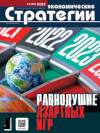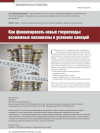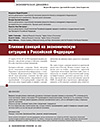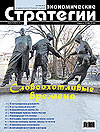On Some Obvious and Non-obvious Risks of the Modern Financial System
DOI: 10.33917/es-4.196.2024.18-25
Despite improving economic indicators and revisions towards better forecasts for 2024, systemic threats and risks, which are not always obvious, remain in the global economy. In the article, the author draws attention to a number of new problems and circumstances that are changing financial landscape in the world. In particular, attention is paid to expanding approaches of central banks in new conditions, risks arising from the technological advancement of commercial banks, which requires more careful control to prevent a destabilizing effect on the financial sector as a whole, etc.
References:
1. BIS. Annual Economic Report. Basel, June, 2023, available at: https://www.bis.org/publ/arpdf/ar2023e.htm
2. UN. World Economic Situation and Prospects. May 2024, available at: https://www.un.org/development/desa/dpad/publication/world-economic-situationand-prospects-as-of-mid-2024/
3. Bank JP Morgan otkroet bolee 500 novykh otdeleniy v blizhayshie tri goda [JP Morgan will Open More than 500 New Branches in the Next Three Years]. Kommersant. 2024. 6 fevralya. URL: https://www.kommersant.ru/doc/6494367
4. China’s central bank hints it may add treasury bond trades to policy toolkit. Reuters. April 23, 2024, available at: https://www.reuters.com/world/china/ chinas-central-bank-hints-it-may-add-treasury-bond-trades-policy-toolkit-2024-04-23/
5. UN. World Economic Situation and Prospects. January 2024. UN, available at: https://www.un.org/development/desa/dpad/publication/world-economicsituation-and-prospects-2024/
6. Roskongress. Zamorozka aktivov. Traditsii i novye printsipy raboty Zapada s aktivami tret’ikh stran [Росконгресс. Roscongress. Freeze of Assets. Traditions and New Principles of Western Work with Assets of Third Countries]. Roskongress, 2023, Dekabr’ available at: https://roscongress.org/materials/ zamorozka-aktivov-samoupravstvo-ili-zakonnyy-shag/











